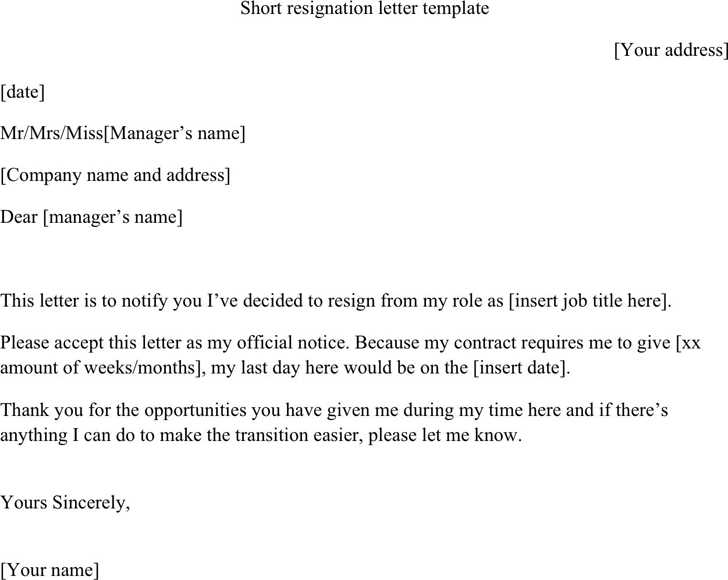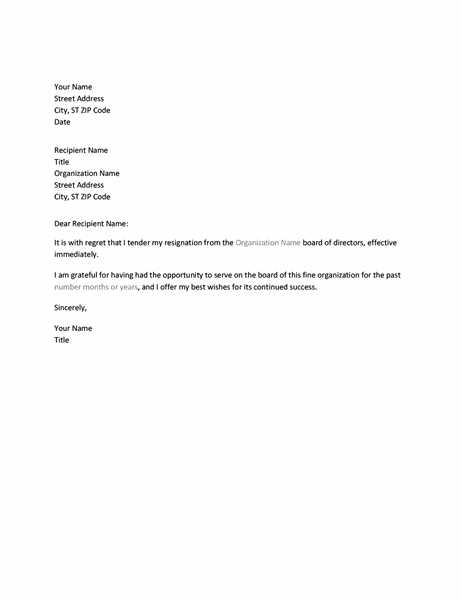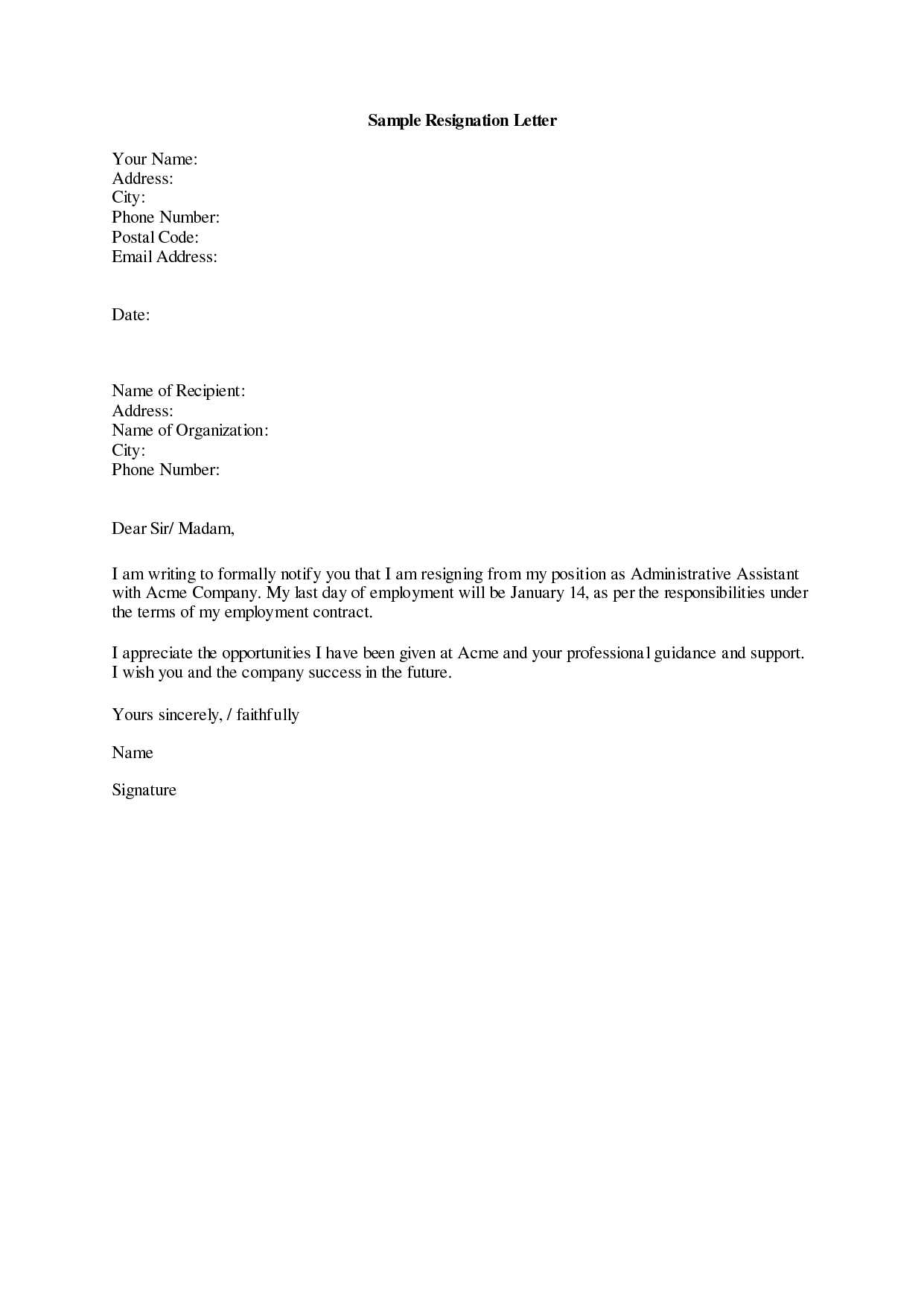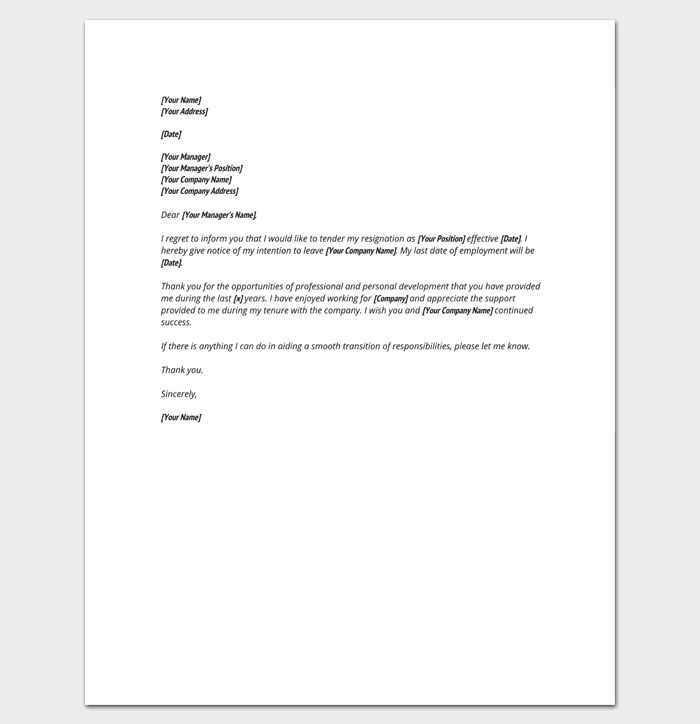Templates for resignation letter short notice

If you need to submit a resignation letter on short notice, keeping it clear and concise is key. Make sure to express gratitude and provide the reason for leaving, while being professional and polite. It’s important to show respect for the employer and the time you’ve spent at the company, even if your notice period is brief.
In your resignation letter, include the date of your last working day, and state your intention to leave the position. Be straightforward and to the point, without over-explaining. Short notice doesn’t leave much room for unnecessary details, so focus on clarity and professionalism.
Below are templates that can help you craft a resignation letter when you’re leaving on short notice. These examples allow you to adapt the tone and content based on your relationship with your employer and the specific circumstances of your resignation.
Each template is designed to be flexible, so you can personalize it as needed. Adjustments can be made to fit your situation, ensuring you leave on good terms, despite the urgency.
Here are the corrected lines:
When submitting a resignation letter on short notice, clarity and professionalism are key. Use direct language and ensure all necessary details are included. Below are examples of how to phrase key elements clearly:
- Opening line: “I am writing to formally resign from my position at [Company Name], effective [last working day].”
- Reason for short notice: “Due to unforeseen circumstances, I am unable to fulfill my notice period. I apologize for the short notice and any inconvenience this may cause.”
- Offer to help during transition: “I am happy to assist in transitioning my responsibilities to ensure a smooth handover.”
- Closing statement: “Thank you for the opportunity to work with the team. I wish everyone continued success at [Company Name].”
Keep your message concise, focusing on key points. Maintain professionalism to leave a positive impression, even when resigning unexpectedly.
- Templates for Resignation Letter with Short Notice
Writing a resignation letter on short notice can feel tricky, but it’s important to keep it direct and respectful. Here are a few templates you can adapt for your situation:
1. Simple and Direct Resignation Letter
This template works well when you need to leave quickly but want to maintain professionalism without too much detail:
Dear [Manager's Name], I am writing to formally resign from my position as [Your Job Title] at [Company Name], effective [Last Working Day]. I apologize for the short notice and understand the inconvenience it may cause. Thank you for the opportunities provided during my time here. Sincerely, [Your Name]
2. Resignation Letter with Reason for Leaving
If you feel comfortable sharing the reason behind your quick departure, this template is appropriate:
Dear [Manager's Name], I regret to inform you that I must resign from my position as [Your Job Title] at [Company Name], effective [Last Working Day]. Due to [brief reason for leaving, e.g., personal circumstances, another opportunity, etc.], I am unable to continue my role. I appreciate the chance to have worked with you and the team, and I apologize for the short notice. Best regards, [Your Name]
3. Resignation Letter with Offer to Assist in Transition
If you want to help ease the transition, this version offers assistance despite the short notice:
Dear [Manager's Name], I am writing to resign from my position as [Your Job Title] at [Company Name], effective [Last Working Day]. I apologize for the short notice and the disruption it may cause. I am happy to assist with the transition in any way I can during my remaining time here. Please let me know how I can help. Thank you for your understanding. Sincerely, [Your Name]
4. Resignation Letter Due to Personal Reasons
This template can be used if your resignation is due to personal matters:
Dear [Manager's Name], Please accept this letter as my formal resignation from my position as [Your Job Title] at [Company Name], effective [Last Working Day]. Due to personal reasons, I must step away from my responsibilities. I apologize for the short notice and I appreciate the support from you and the team during my time here. Sincerely, [Your Name]
5. Resignation Letter with Gratitude
If you’d like to express your appreciation for the opportunity, try this template:
Dear [Manager's Name], I am resigning from my position as [Your Job Title] at [Company Name], effective [Last Working Day]. I regret the short notice, but I must move on due to [reason, if desired]. Thank you for the guidance and experiences I've gained during my time here. It’s been a pleasure working with such a dedicated team. Best regards, [Your Name]
Additional Tips

| Tip | Explanation |
|---|---|
| Be clear about the effective date | State your last working day as soon as possible to give your employer clarity. |
| Keep it professional | Even if you’re leaving under difficult circumstances, remain polite and professional. |
| Offer to help | If possible, offer to assist with the transition process to show goodwill. |
If you must resign with less than two weeks’ notice, keep your letter professional and respectful. Acknowledge the situation, express gratitude, and maintain a clear, concise tone. Here’s how to approach it:
1. Acknowledge the Short Notice
Start by directly addressing the short notice. This helps set the tone for your resignation and shows you’re aware of the inconvenience it may cause. Be clear about your reasons, but avoid unnecessary details.
2. Express Gratitude
Even if the timing is tight, acknowledge the opportunities and experiences you’ve had. This maintains a positive relationship with the employer and leaves a good impression.
3. Offer Help During the Transition

If possible, offer assistance in wrapping up any ongoing work or training a replacement. This shows your commitment to a smooth handover despite the short notice.
4. Keep it Simple
Stick to the key points. Don’t add excessive detail that could come across as overly apologetic or defensive. Focus on the essentials: resignation, notice period, and gratitude.
| Step | What to Include |
|---|---|
| 1. Acknowledge Short Notice | Be honest and direct about the timing, acknowledging any inconvenience caused. |
| 2. Express Gratitude | Thank your employer for the experience and opportunities during your time there. |
| 3. Offer Help | If possible, offer support during the transition period. |
| 4. Keep it Short | Stick to the key points, avoiding over-explanation. |
In a resignation letter with short notice, professionalism and clarity are your best approach. Aim to leave on good terms, even if the situation isn’t ideal for either party.
Clearly state your decision to resign, acknowledging the short notice. This lets the recipient know immediately what to expect.
1. Reason for Resignation (Optional)
While you may not want to go into specifics, a brief explanation can help maintain goodwill. Be concise and avoid overly personal details.
2. Acknowledgment of Company Policies
If your resignation breaks a contract or policy, acknowledge that you are aware of it and explain your situation briefly, showing respect for company guidelines.
3. Date of Last Working Day
Include the exact date you plan to leave, factoring in the notice period you’re able to give. This helps HR manage the transition.
4. Offer Assistance
Offer help in wrapping up your responsibilities or training a replacement, even if your time is limited. It shows professionalism and consideration for your team.
5. Gratitude
Express thanks for the opportunity to work with the company. Even a short statement of appreciation can leave a positive impression.
6. Contact Information
Ensure your contact information is updated in case the company needs to reach you post-departure.
When resigning on short notice, it is crucial to maintain a tone of professionalism while being clear about your decision. The phrasing should be polite, direct, and considerate of the company’s position. Below are some practical tips for crafting your resignation letter.
- Start by clearly stating your intention to resign. Avoid ambiguity and ensure that your message is clear from the outset. For example, “I am writing to formally resign from my position as [Job Title], effective [Date].”
- Be concise about your reason for leaving, but avoid overly detailed explanations. If you must mention the reason, keep it neutral and avoid placing blame. A simple approach: “Due to unforeseen personal circumstances, I must resign effective immediately.”
- Express appreciation for the opportunity to work with the company. This shows respect and leaves a positive impression: “I have greatly appreciated the opportunities provided to me during my time at [Company Name].”
- Offer assistance with the transition process, even if you are leaving on short notice. It demonstrates goodwill: “Please let me know how I can assist in the transition process to ensure a smooth handover.”
- Be respectful of the notice period. While you may not be able to give the usual notice, acknowledge the company’s need for time to adjust: “I understand that my departure on short notice may cause inconvenience, and I appreciate your understanding.”
- Keep the tone professional, even if you are leaving due to difficult circumstances. Avoid negative language or criticism of the company or colleagues: “I wish the team continued success moving forward.”
Avoid leaving out the reason for your departure. Even if it’s brief, stating why you are resigning helps maintain transparency and shows professionalism. However, do not go into unnecessary detail or speak negatively about the company or colleagues.
Do not forget to address your resignation formally. Always include the date of your last working day, ensuring there’s no confusion. Be clear and concise, and avoid vague phrases like “I will be leaving soon.” Instead, specify the date to avoid miscommunication.
Refrain from being overly apologetic. While it’s good to express regret for the short notice, don’t overdo it or make it sound like you’re guilty. A simple, respectful statement like “I regret the short notice” is sufficient.
Never forget to offer assistance during the transition period. This shows you’re willing to leave on good terms. A short offer to help with training or handing over responsibilities will leave a positive impression.
Don’t make the resignation letter too long. Keep it professional, clear, and to the point. Avoid unnecessary explanations or emotional language. A short notice resignation letter should stay focused on the essentials.
Lastly, avoid using casual language. Keep the tone formal and respectful, as this letter is a professional document. It should reflect your commitment to leaving with respect and dignity, regardless of the circumstances.
Provide an explanation for leaving on short notice when your departure might cause confusion or disrupt ongoing projects. It is important to address the situation clearly, especially if the decision is unexpected or if colleagues or management might be left wondering about the reasons behind your decision.
When It’s Related to Personal Issues
If your reason for leaving is due to personal or family emergencies, briefly explain the situation. This shows that your decision is not a reflection of the company or colleagues, but a matter outside your control. Keep the tone respectful and avoid oversharing details.
When You’re Leaving for a New Opportunity
Explain the reason for leaving if it’s to pursue a new career opportunity. A simple statement like, “I’ve accepted a new role that aligns better with my long-term goals,” is often enough. Transparency helps maintain a positive relationship, though you don’t need to go into specifics about the new job.
In cases where leaving on short notice might be challenging for your team, providing context can help manage expectations and show respect for your employer’s time. Keep the explanation brief, factual, and professional, focusing on the key points.
Communicate openly and respectfully with your employer and colleagues. Express gratitude for the opportunities provided, and highlight specific experiences you enjoyed. Let them know that your decision is driven by personal or professional reasons, not dissatisfaction with the company.
Be Transparent About Your Reason for Leaving
Even with a short notice period, being honest about why you’re leaving is key. You don’t need to go into excessive detail, but a clear, concise explanation will help avoid misunderstandings. It’s crucial to leave the door open for future opportunities, so show that you still value your time with the team.
Offer to Assist During the Transition
Offer help with the transition by assisting in training your replacement, creating detailed handover notes, or helping complete urgent projects. Demonstrating your commitment to a smooth transition shows professionalism and helps preserve positive relationships.
Maintain a friendly and supportive attitude during your remaining time. A positive final impression can pave the way for future connections or opportunities. Leaving on good terms can also serve as a strong reference point in the future.
Recommendations for Short Notice Resignation Letters

Be clear and direct in your resignation letter. Start by stating your decision to resign and specify your last working day. If you’re resigning on short notice, it’s essential to express understanding of any inconvenience this may cause. Offer assistance in transitioning, if possible, but remain concise.
For example: “I regret to inform you that I am resigning from my position at [Company Name], effective [Date]. I apologize for the short notice and understand the challenges this might create. I am committed to helping during the transition process and will ensure a smooth handover of my responsibilities.”
Avoid unnecessary details about why you’re leaving, unless it’s pertinent to the transition. Keep the tone respectful, showing gratitude for the opportunities you had at the company. Acknowledge the positive aspects of your time there without going into lengthy descriptions.
“I have enjoyed my time with the team and appreciate the support I received during my tenure. I am grateful for the skills I’ve developed here and the relationships I’ve built.”
End with an offer to stay in touch. A simple sentence such as “I look forward to maintaining a professional connection.” leaves the door open for future networking, without overcomplicating the message.